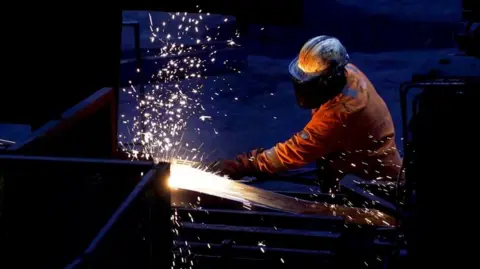The UK government is poised to assume control of the nation’s third-largest steelworks, Speciality Steels UK (SSUK), located in South Yorkshire. This action underscores the ongoing struggle within the steel industry as economic pressures continue to mount, threatening jobs and production capabilities. With 1,500 jobs at stake, the government’s intervention seeks not only to save these positions but to stabilize a vital sector that has faced persistent financial duress.
Tasked with managing the steelworks will be appointed managers, a step ordered by the court as concerns about the company’s future loom large. SSUK has long been known for utilizing scrap metal in steel production, a process that has been beneficial for both the environment and the economy. However, recent developments have highlighted the precarious financial situation facing SSUK, primarily stemming from substantial debts that have left the company’s ability to procure necessary scrap metal severely hampered. This disruption can largely be traced back to the collapse of Liberty Steel’s major lender, which precipitated a crisis in operational liquidity.
This latest move follows a similar scenario where the government intervened with British Steel in Scunthorpe earlier this year, preventing the closure of the last UK plant that produces virgin steel. As steel production remains critical to the nation’s infrastructure and wider economy, such interventions reflect a growing recognition of the strategic importance of steelworks in the UK.
SSUK is particularly instrumental in the industry’s transition towards energy efficiency. The facility houses the UK’s only electric arc furnaces—more sustainable than traditional methods—positioning it as a key player in the sector. However, despite its advanced technologies and potential for energy-efficient practices, the reality of mounting financial woes casts a shadow over its future.
As the situation develops, a High Court judge is expected to deliberate on SSUK’s fate. Opinions differ sharply, with some advocating for the administration process under Sanjeev Gupta, the executive chairman of GFG Alliance, which owns Liberty Steel. His legal team is pushing for a temporary pause to explore options for an administrative sale of the company, which would allow SSUK to sidestep a government takeover and potentially recover from its financial troubles.
Conversely, creditors, who are collectively owed hundreds of millions, are pushing for compulsory liquidation. Their goal is to facilitate the sale of Liberty Steel’s assets to clear off substantial debts. Insiders have noted ongoing negotiations with major investment firms, like Blackrock, aiming to secure new funding to assist in navigating these turbulent waters.
Despite the government’s stated support for the steel industry, it has expressed reluctance regarding Gupta’s proposals for further aid. This reluctance serves to illustrate the difficult balancing act the government must perform: supporting a critical industry while protecting taxpayer interests amid fears of protracted losses.
The complexities surrounding SSUK’s potential government takeover highlight the interconnectedness of securing jobs, mitigating industry decline, and navigating the financial follies of corporate governance. The government is prepared to take on the burden of managing a loss-making steel plant if necessary, pursuing avenues that would safeguard job security while also being mindful of taxpayer ramifications.
The scenario paints a challenging picture for the steel industry in the UK, where the urgency for a resolution is palpable. The fate of SSUK remains under scrutiny as stakeholders, including employees, creditors, and governmental bodies, await definitive actions that could influence the course of one of the nation’s pivotal manufacturing sectors. As the situation continues to evolve, the outcome will not only determine the fate of SSUK but will also have wider implications for the economic landscape of the UK’s steel production capabilities.











